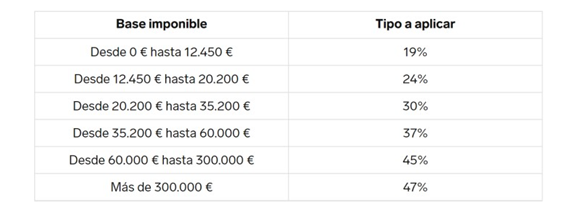Personal income tax return 2022

The annual returns Model 100 and Model 714
If you live in Spain, you have undoubtedly heard of model 100 and / or model 714. Both models are important for residents of Spain and concern the declaration of your world income and world wealth. Between 6 April and 30 June at the latest, you can declare these incomes and assets.
The modelo 100
Model 100. Impuesto sobre la Renta de las Personas Físicas. Declaración anual.
Once Spain has become your permanent residence you will fall under the category of Spanish resident, Spanish tax resident. This means that you have fiscal obligations in Spain - Spain considers you as fiscal resident when you stay more than 183 + 1 days in Spain (this can be consecutive or with intervals). Please note that as a fiscal resident there are differences in obligations, it can be that you only have to make a declaration of your income or it can be that you also have to pay taxes. This depends on various factors.
When you are considered as tax resident in Spain you will have to declare your worldwide income to the Spanish tax authorities between the beginning of April of the current calendar year and the end of June of the current calendar year (June 30th is the last day). Someone who stays more than 183 +1 days per year in Spain, even when he has not yet applied for a residency, will be seen by the Spanish tax authorities as tax resident!
In Spain, the income tax is progressive (i.e. the tax rate increases per bracket in relation to the amount of income received). For the income of the previous calendar year = fiscal year, the applicable rates are between 19% - 45% since 2020. As a Spanish resident, you can deduct up to a certain amount of mortgage costs (interest and repayments of the first and only home in Spain) from your taxable income.

Important note: If, for example, you receive an income (pension, interest, dividends, returns,...) which is taxed at source, then you will not pay taxes in Spain on this income unless there is an agreement between Spain and that country to avoid double taxation.
Important note on the number 22,000 and the exemption!
What does this have to do with who has to file a tax return for residents in Spain? This is one of those areas where figures have only added to the confusion. The issue of who should file a tax return for residents has been rather confused over the years by the publication of the amount, €22,000 as the threshold.
Some people have the idea that if your income is lower, you do not have to file a tax return. Various publications from news sources report only half the reality of this issue or their explanations are incomplete. Every year, this causes confusion and endless discussions. Here, we will make it clear to you once and for all.
You are only exempt from paying €22,000 if you are employed by only one employer and already pay Spanish withholding tax as you earn. A situation that applies to very few expats.
So, submitting your tax return correctly avoids that you can be fined for not declaring or declaring incorrectly, but a tax return also has benefits. Presenting annual tax returns makes obtaining a tax residency certificate - El certificado de Residencia Fiscal - much easier. The tax residency certificate is what is needed in the case of claiming residency for inheritance purposes. You will also need one to ensure that there is no 3% retention if you sell your Spanish property as a Spanish tax payer.
The modelo 714
Modelo 714. Impuesto sobre el Patrimonio. Declaración y documento de ingreso
You are obliged to file a wealth tax return in Spain on your own initiative, annually before 30 June, if your assets exceed the exemptions in Spain.
If your gross assets (your assets without deduction of debts) are more than EUR 2 million, you must always file a tax return, even if your net assets (after deduction of debts) fall under the exemptions.
Residents have to declare their assets in Spain and in other countries. Non-residents only have to declare their assets in Spain. The tax that has to be paid in Spain can usually be settled in the home country.
Residents and non-residents only have to pay wealth tax if they have assets above 700,000 Euro s with an exemption for their own (main) home (vivienda habitual) 300,000 Euro s (does not apply to non-residents as they do not have a main home in Spain).
What can Segurantis do for you?
Segurantis can take care of your personal tax for both residents and non-residents in Spain. Feel free to contact us to discuss your situation.









Related Posts